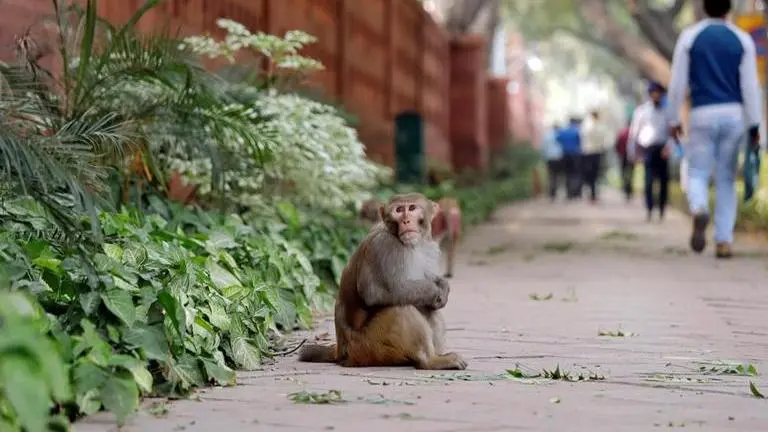Updated 11 July 2019 at 14:03 IST
Monkey menace: Confusion over jurisdiction keeps problem alive in Delhi
Despite spending crores on catching monkeys from residential areas and relocating them to the Asola Wildlife Sanctuary, the national capital recorded around 950 cases of monkey bites and five deaths last year and is far from curbing the simian menace.
- India News
- 0 min read

Despite spending crores on catching monkeys from residential areas and relocating them to the Asola Wildlife Sanctuary, the national capital recorded around 950 cases of monkey bites and five deaths last year and is far from curbing the simian menace.
The primary reason why the problem continues to persist, according to many, is the confusion over who's responsible for catching monkeys or sterilising them -- the civic bodies or the forest department.
In 2007, the Delhi High Court had asked the city government to provide cages for catching monkeys and municipal corporations to place them at various spots.
The court directed authorities to shift the monkeys caught to the Asola sanctuary and the forest department to provide them food so that they do not venture out.
Advertisement
In a bid to prevent monkeys from returning to human habitations, it had also directed authorities to erect a 15-feet wall in "the outer area of the sites where the monkeys are to be shifted".
Officials said over 20,000 monkeys have been shifted to the sanctuary and there's no exact number as to how many are roaming free in human habitations.
Advertisement
Also, monkeys keep returning to human habitations from Asola sanctuary because the walls have iron joints that help monkeys escape.
In 2018, the corporations collectively caught 878 monkeys, with the EDMC catching only 20.
An official of South Delhi Municipal Corporation said rhesus macaques is a protected species under the Wildlife (Protection) Act, 1972 which means the responsibility of catching and relocating them lies with the forest department.
He also cited an advisory issued by Environment Ministry last year that states, "Rhesus macaques is a protected species under the Act and managing such wild animals and their habitat is the mandate of the forest department and not of local bodies."
The high court's directions are ambiguous. These do not specify who's responsible for catching monkeys and their sterilisation, the official said.
The forest department argues that "monkeys found in human habitations have been domesticated and they are not wild animals".
"Their third-fourth generations were born in residential areas. They cannot live in jungles. The Asola sanctuary has exceeded its carrying capacity and the simians are returning to the nearby human habitations," a forest department official said.
In 2018, Delhi's Chief Wildlife Warden Ishwar Singh suggested laparoscopic sterilization to control their population.
Thereafter, a panel set up by the high court, which included Delhi chief wildlife warden, civic bodies and DDA officers and Soniya Ghosh, a member of an NGO, surveyed the monkey sterilization project of NGO Wildlife SOS in Agra implemented in association with the Agra Development Authority.
The idea was to set up temporary sterilization camps, capture the entire troop of monkeys, segregate those of reproductive age, sterilize them, give them a tattoo for identification and set them free again.
Mostly, monkey bite cases take place when the simians are separated from their troops, making them angry, the official explained.
"Our view is that the growing population of monkeys should be arrested through sterilization and the problem should not be shifted from place A to place B. There's no atrocity involved in the surgery," Singh said.
"The forest department floated tenders thrice -- in July and August last year and January this year -- to engage an agency for sterilization of monkeys but due to opposition from animal rights activists, no one came forward, not even Wildlife SOS which was assisting the government in the case," another official said.
Animal rights activists have been proposing sterilization of dogs but are objecting to surgery of monkeys, he said. In January, the Centre sanctioned Rs 5.43 crore to the forest department for sterilization of 8,000 monkeys in the first year. Animal rights activist Gauri Maulekhi argued human proximity during sterilization can make monkeys more aggressive.
"We have seen it happening in Himachal Pradesh where more 1.5 lakh monkeys were sterilised. Later, the government in the hill state had to declare the simians vermin. In Agra too, sterilisation led to an increase in cases of monkey bites. Sterilisation is only good for companion animals like dogs and cats," she said.
She favoured administering a reversible contraceptive vaccine to control monkey population. The environment ministry has sanctioned funds to National Institute of Immunology and Wildlife Institute of India which are developing the vaccine.
"We hope the vaccine will be available in the market in another 10 months," she said.
A government official said the vaccine has only been tried on elephants. Laboratory and field trials on monkeys will take another 6-7 years. Sterilization costs around Rs 1,500 per monkey while the vaccine is much more expensive.
Now, the veterinary department of the Delhi government has been asked to earmark a few spots in the city to start a pilot project for sterilization of monkeys. Catching monkeys is going to be another uphill task as corporations have reported a dearth of monkey catchers and resources. Officials at the NDMC and the EDMC said there are only one or two monkey catchers available.
"We pay them Rs 1,200 per money, while the SDMC pays them 2,400. So, monkey catchers prefer working there," NDMC Deputy Director Y Kumar said.
Recently, the high court turned down SDMC's plea to modify its 2007 direction. The corporation is now mulling filing a review petition.
Published By : Press Trust Of India
Published On: 11 July 2019 at 12:57 IST
